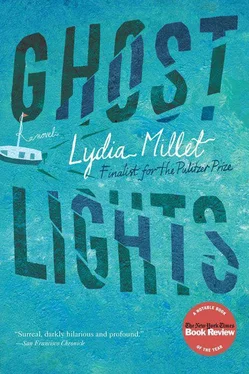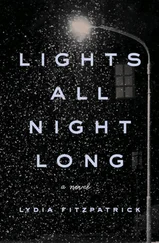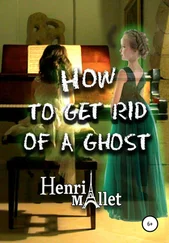Lydia Millet - Ghost Lights
Здесь есть возможность читать онлайн «Lydia Millet - Ghost Lights» весь текст электронной книги совершенно бесплатно (целиком полную версию без сокращений). В некоторых случаях можно слушать аудио, скачать через торрент в формате fb2 и присутствует краткое содержание. Издательство: W. W. Norton & Company, Жанр: Современная проза, на английском языке. Описание произведения, (предисловие) а так же отзывы посетителей доступны на портале библиотеки ЛибКат.
- Название:Ghost Lights
- Автор:
- Издательство:W. W. Norton & Company
- Жанр:
- Год:неизвестен
- ISBN:нет данных
- Рейтинг книги:5 / 5. Голосов: 1
-
Избранное:Добавить в избранное
- Отзывы:
-
Ваша оценка:
- 100
- 1
- 2
- 3
- 4
- 5
Ghost Lights: краткое содержание, описание и аннотация
Предлагаем к чтению аннотацию, описание, краткое содержание или предисловие (зависит от того, что написал сам автор книги «Ghost Lights»). Если вы не нашли необходимую информацию о книге — напишите в комментариях, мы постараемся отыскать её.
How the Dead Dream
Ghost Lights
Ghost Lights
Ghost Lights — читать онлайн бесплатно полную книгу (весь текст) целиком
Ниже представлен текст книги, разбитый по страницам. Система сохранения места последней прочитанной страницы, позволяет с удобством читать онлайн бесплатно книгу «Ghost Lights», без необходимости каждый раз заново искать на чём Вы остановились. Поставьте закладку, и сможете в любой момент перейти на страницу, на которой закончили чтение.
Интервал:
Закладка:
“My wife’s employer disappeared on one of the Monkey River boat tours, just a few weeks ago,” he announced.
The boys ignored both him and the scenery. They had found what they were looking for; frantically they pressed buttons on their handheld video games. Beadily concentrating. This was a comfort since it showed they were as venal as regular U.S. children.
“We think he’s probably dead,” he went on.
There was something about the Germans and their seamless tans. He felt like shocking them.
“Oh my God,” said the German woman.
She seemed earnestly concerned. The husband held her hand and nodded, also looking worried. Not only were the Germans beautiful and cheerful, they were also capable of empathy.
“What do they think happened?” asked the husband.
Hal was faintly gratified to note he had the typical German accent, endearing because it was also quite foolish-sounding. A slight but recognizable z sound on his th ’s.
“No idea,” said Hal, a little too breezily perhaps. “The boat came floating back empty.” He turned and dipped into the backpack, handing over one of the photographs.
“When was this?” asked the husband, studying it.
“A few weeks ago. I’m here looking for him,” said Hal.
“But there aren’t any rapids,” said the woman, peering over her husband’s shoulder at the picture. “It couldn’t have been a drowning accident, or?”
“Maybe there were mechanical problems,” said the husband. “If you are going to see this boat, you should check the outboard motor.”
“Cannibals,” said Hal.
They looked at him blankly. No doubt alarmed at his callousness. But they had a point. It wasn’t witty.
“The truth is, we don’t know what happened,” he went on quickly, to cover up his inane remark. “That’s what I’m here for. I’m here to find out.”
He caught himself wanting to mollify them. The Germans should not think ill of him, after all. They were not unlike superheroes. You might mock them for their stolid, self-righteous attitudes and overly muscled chests, but still you wanted to remain in their good graces.
The three of them sat in an ambiguous silence for a few moments until the Germans turned and said something to each other in discreet, low tones in their guttural language. He imagined it was along the lines of “What a pig this guy is,” or “Americans are stupid.” He faced into the spray and closed his eyes, but then he felt a soft hand on his arm.
“Let us know,” said the German woman gently, “if there is anything we can do to help you.”
He found he was blinking back tears. It came on him without warning. He tried to smile at her, at the same time turning away a little to disguise his emotion. Ahead of them there were a few boats out on the water, and to the east a low, blurry line of trees on a far-out island.
What about him and Susan? Once, when they were young, they could have passed for Germans. Couldn’t they? He was unable to look at the Germans to verify it. They might see the tears that stood on his lower lids. But if he could look at them, he would see statuesque beauty. See what humans could be: weightless and straight, beautiful in their purpose and their autonomy. The sun shone down on them and the breeze whipped back their light clothing.
But he and Susan had both aged out of that splendid independence, or the illusion of it. Whatever it was that young, beautiful people had — people who were young and strong, who could scale cliffs and toss their heads back in laughter, whose cheekbones caught the sun. Their own outlines were not so fine, their shoulders and profiles not so elegant.
Was it worse to have been beautiful once and not be beautiful anymore? Or to never have been beautiful at all?
Because he had never been a German.
And poor Casey had never been the blond boys.
She was better, his love said — better! She was everything.
But briefly it twisted him with sadness, this matter of never having been German.
•
It took a long, dull while to find the man he was looking for once he and the Germans parted company. He sat in a small restaurant with wooden floors, where they served nothing but fish with too many small bones in it and no discernible seasoning and rice and beans and warm soda. He waited. These were his instructions; another man had told him the first man, the tour guide’s brother, was on the water and would come in later.
He had tried waiting outside the brother’s house for a while but there was nowhere to sit, only a patch of dirt beside a screen door hanging off a single hinge, and eventually he had wandered back to the restaurant and told the hostess he would like to wait at a table, please.
Once or twice he got up and walked around, stretching his legs. In the back of the restaurant, on a small, dusty table, they sold folk art of a heartrending ugliness.
The Germans were coming back at four-thirty, when he was due to meet them at the ocean pier again for the ride back to the hotel. He consulted his watch frequently and worried that the brother wouldn’t show up by then, that he’d come all this way for nothing. Finally he fell asleep with his head on his arms on the table, and a man came and tapped his elbow. He jerked his head up in startlement.
It was an older man, dark-skinned with thinning hair cropped close to his head.
“Mr. Lindley?” he asked, and Hal nodded, still sleep-addled, and gestured at him to please sit down, and could he get him something to eat or drink.
When they both had grape sodas in front of them — the only thing available in a bottle besides beer — Hal said he understood the man’s brother had taken Stern on the boat, and only the boat had come back. The man said it was his half-brother Dylan, and that yes, the boat had come back but not the men.
At first, when the boat was discovered, no one was sure whether to do anything. After all the men had been headed out on a cross-country backpacking trip. The loss of their boat would be a handicap, but only when they returned to the trailhead at the river and found it missing. No one knew when to send another boat looking for them. They had taken enough supplies for a couple of weeks, and Dylan knew the braids of the river well and could bring them back down without the boat. On the other hand, if their food was entirely depleted by the time they discovered the boat was missing, that could be a problem.
Hal remembered what the German had said and asked about the boat’s outboard motor. The brother said it was broken, one of the blades had snapped, but it was not clear when this had occurred, whether it was before or after the boat had been separated from the men. It was more likely, said the brother, that it had happened when the motor was running. But this made little sense, because Dylan would not have abandoned the boat. Under no circumstances. He had bought it himself and rebuilt it with his own hands.
In any case, said the brother, they had to assume, at this point, weeks later, that the men were not returning.
He would never have thought it could happen. The Monkey was a slow, muddy river; the only possible human predators in the rainforest were jaguars, and in many generations none of these had harmed anyone. There were venomous snakes like the fer-de-lance, but it was unlikely a snake would have bitten both men. Possibly they had been attacked by thieves or guerrillas wandering the jungle, but that too was extremely far-fetched.
He was confused. He was mourning his brother but it was an odd, uncertain mourning.
“If I needed to find out more,” said Hal, “what could I do?”
“I don’t know,” said the man, and finished his grape soda. His way of speaking had a kind of Creole lilt, or maybe Caribbean generally. It was melodious.
Читать дальшеИнтервал:
Закладка:
Похожие книги на «Ghost Lights»
Представляем Вашему вниманию похожие книги на «Ghost Lights» списком для выбора. Мы отобрали схожую по названию и смыслу литературу в надежде предоставить читателям больше вариантов отыскать новые, интересные, ещё непрочитанные произведения.
Обсуждение, отзывы о книге «Ghost Lights» и просто собственные мнения читателей. Оставьте ваши комментарии, напишите, что Вы думаете о произведении, его смысле или главных героях. Укажите что конкретно понравилось, а что нет, и почему Вы так считаете.












